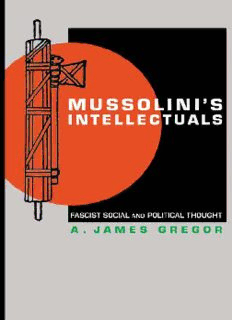
Mussolini's Intellectuals: Fascist Social and Political Thought PDF
Preview Mussolini's Intellectuals: Fascist Social and Political Thought
MUSSOLINI’S INTELLECTUALS This page intentionally left blank MUSSOLINI’S INTELLECTUALS FASCIST SOCIAL AND POLITICAL THOUGHT A. James Gregor PRINCETON UNIVERSITY PRESS PRINCETON AND OXFORD Copyright©2005byPrincetonUniversityPress PublishedbyPrincetonUniversityPress,41WilliamStreet, Princeton,NewJersey08540 IntheUnitedKingdom:PrincetonUniversityPress, 3MarketPlace,Woodstock,OxfordshireOX201SY AllRightsReserved LibraryofCongressCataloging-in-PublicationData Gregor,A.James(AnthonyJames),1929– Mussolini’sintellectuals:fascistsocialandpoliticalthought/ A.JamesGregor. p. cm. Includesbibliographicalreferencesandindex. ISBN:0-691-12009-9(acid-freepaper) 1.Fascism—Italy—History—20thcentury.2.Intellectuals—Italy— History—20thcentury.3.Intellectuals—Italy—Politicalactivity—History— 20thcentury.4.Italy—Intellectuallife—20thcentury.5.Italy—Politicsand government—20thcentury.I.Title. DG571.G7342005 320.53′3′094509042—dc22 2004049133 BritishLibraryCataloging-in-PublicationDataisavailable ThisbookhasbeencomposedinSabon Printedonacid-freepaper.∞ pup.princeton.edu PrintedintheUnitedStatesofAmerica 1 3 5 7 9 10 8 6 4 2 The work embodied in this book is dedicated to all those who, willingly and unwillingly, accompanied me on my journey. This page intentionally left blank Contents Preface ix Acknowledgments xi ChapterOne SomeIssuesintheIntellectualHistoryofFascism 1 ChapterTwo TheHistoricBackgroundandEnricoCorradini 18 ChapterThree AlfredoRoccoandtheElementsofFascistDoctrine 38 ChapterFour SergioPanunzio:FromRevolutionarytoNationalSyndicalism 61 ChapterFive Idealism,UgoSpirito,andtheOutlinesofFascistDoctrine 85 ChapterSix UgoSpiritoandtheRationaleoftheCorporativeState 111 ChapterSeven SergioPanunzioandtheMaturingofFascistDoctrine 140 ChapterEight CamilloPellizzi,CarloCostamagna,andtheFinalIssues 165 ChapterNine DoctrinalInterlude:TheInitiaticRacismofJuliusEvola 191 ChapterTen DoctrinalContinuityandtheFascistSocialRepublic 222 ChapterEleven Conclusions 246 Index 263 This page intentionally left blank Preface THIS BOOKappears afteralmost four decadesof study,conferences, dis- cussion, and publication. Over those years, students of “fascism,”1 as a subject of inquiry, have seen its “essence” change, in the judgments of scholars,fromamovementofthe“extremeright”intoonethatwasnei- therofthe“right”northe“left.”2Wearenowtoldthat“Fascistideology represented a synthesis of organic nationalism with the antimaterialist revisionofMarxism.”3 Fromapoliticalrevolutionentirelywithoutanypretenseofarational belief system, we are now told, by those best informed, that “fascism’s ability to appeal to important intellectuals ... underlines that it cannot bedismissedas...irrational....[In]truth,fascismwasanideologyjust liketheothers.”4Moreover,ithasbeenacknowledgedthat“Fascismwas possibleonlyifbasedongenuinebelief.”5 Ineffect,thestudyofItalianFascismhasdelivereditselfofsignificantly altered assessments over the past decades. Where, at one time, Fascism wassimplydismissedasaphenomenonunderstoodtobewithoutintellec- tual substance, a right-wing excrescence that invoked violence and war, it is now more and more regularly understood to be a movement, and a regime, predicated on a reasonably well articulated belief system that engagedtherationalcommitmentofmany. Forallthat,thereremainsaresidueofopinionthatcontinuestodeny Fascismthesamereasonedbeliefsthateveryonereadilygrantstothepolit- icalmovementsandregimesofJosephStalinorMaoZedong.Wearestill told, for example, that unlike Stalinism and Maoism, “Fascism had few truebelieverswhocouldalsowritearticlesandbooks.”6Strange. Oneoftheprincipalpurposesofthepresentworkistoattempttochal- lengesuchnotions.Fascistintellectualswroteandpublishedasmanyarti- 1Generallythelowercase“fascism”referstoaclassofmovementsorregimes.Theterm “Fascism,”capitalized,referstoMussolini’spoliticalmovementandregime. 2“Fascism did not belong to the extreme Left, yet defining it as part of the extreme Rightisnotveryilluminatingeither.Inmanyrespects,fascismwasnotconservativeatallin inspiration.”WalterLaqueur,Fascism:Past,Present,Future(NewYork:OxfordUniversity Press,1999),p.13. 3ZeevSternhell,TheBirthofFascistIdeology:FromCulturalRebelliontoPoliticalRev- olution(Princeton:PrincetonUniversityPress,1994),p.6. 4RogerEatwell,Fascism:AHistory(NewYork:PenguinBooks,1997),pp.xix–xx,4. 5Laqueur,Fascism,p.27. 6Ibid.,p.97.
Description: